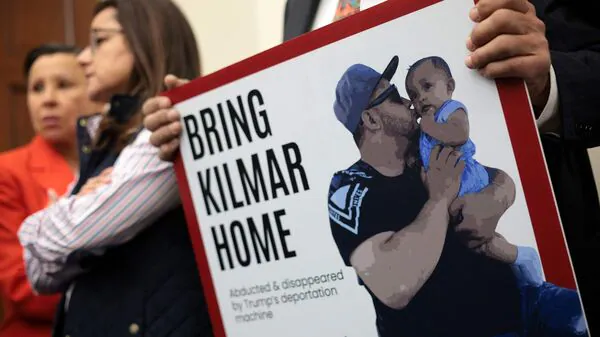Trapped Abroad: U.S. Citizen Wrongfully Sent to El Salvador’s Harshest Prison
Kilmar Abrego Garcia was living a quiet, hardworking life in Maryland with his wife and children — until one day, without warning, he was taken away by U.S. immigration officials and deported to El Salvador. The problem? He was never supposed to be deported in the first place.
Abrego Garcia, who had legal protection from deportation and no criminal record, found himself caught in a bureaucratic nightmare. Despite a standing court order to remain in the U.S., he was mistakenly removed in March 2025. Now, he’s being held in a maximum-security prison in El Salvador — a place known for holding gang leaders and alleged terrorists, not innocent fathers trying to raise a family in the suburbs.
“They Said It Was a Mistake” — But That Didn’t Bring Him Back
According to his legal team, the U.S. government has admitted that deporting Kilmar was an “administrative error.” But for his wife and children, those words don’t erase the trauma.
“They came and took him in the middle of the night,” his wife told reporters. “We kept telling them he had legal status, that a judge had said he couldn’t be deported. They didn’t listen.”

What makes the situation worse is that even after the U.S. courts ordered that Kilmar be returned, the federal government hasn’t brought him home. His family’s lawyers say the government is dragging its feet, claiming it’s now out of their hands since Kilmar is in another country.
From Suburban Dad to Detainee in a Notorious Salvadoran Prison
As if the wrongful deportation weren’t bad enough, Kilmar was sent straight to El Salvador’s infamous mega-prison — the Terrorism Confinement Center, or CECOT. It’s a place criticized by international human rights groups for its brutal conditions and lack of due process.
President Nayib Bukele’s administration in El Salvador is refusing to release him. Bukele insists Kilmar is linked to criminal groups — despite no evidence, no trial, and no criminal history. His wife calls the accusations absurd.
“He has never been in a gang. He has no tattoos. No criminal record. He’s just a dad, a husband, a worker,” she said through tears. “They sent him to a place for the worst criminals, and he doesn’t belong there.”
A Legal Battle That’s Far From Over
Kilmar’s legal team quickly went to court after his deportation and won a major victory. A federal judge ruled the U.S. had no right to deport him and ordered that he be returned. The Supreme Court even upheld the ruling. But still, Kilmar remains locked up thousands of miles away.
“We’ve done everything legally possible,” his attorney said. “The government admits the mistake, but no one is doing what needs to be done to fix it.”
The case has now become a political flashpoint, with critics accusing the administration of failing to act and abandoning its responsibilities.
Human Rights Groups Sound the Alarm
International human rights organizations are calling the case a chilling example of how fragile protections can be — even for those who have done everything right. The prison Kilmar is in has been called “inhumane” and a “legal black hole” by watchdog groups.
“It’s deeply disturbing that a man with legal U.S. residency can be deported illegally and left to rot in a foreign prison,” said one human rights advocate. “This could happen to anyone.”
His Family Is Still Waiting
Back in Maryland, Kilmar’s children ask when their dad is coming home. His wife doesn’t have an answer.
“He always made breakfast before going to work. He helped with homework. He was our rock,” she said. “Now we don’t even know if he’s safe.”
Lawyers are now considering pushing for a contempt of court ruling against U.S. officials in an effort to force action. But for now, Kilmar remains stuck — wrongfully deported, wrongly imprisoned, and far from the life he built in the United States.


Comments are closed, but trackbacks and pingbacks are open.